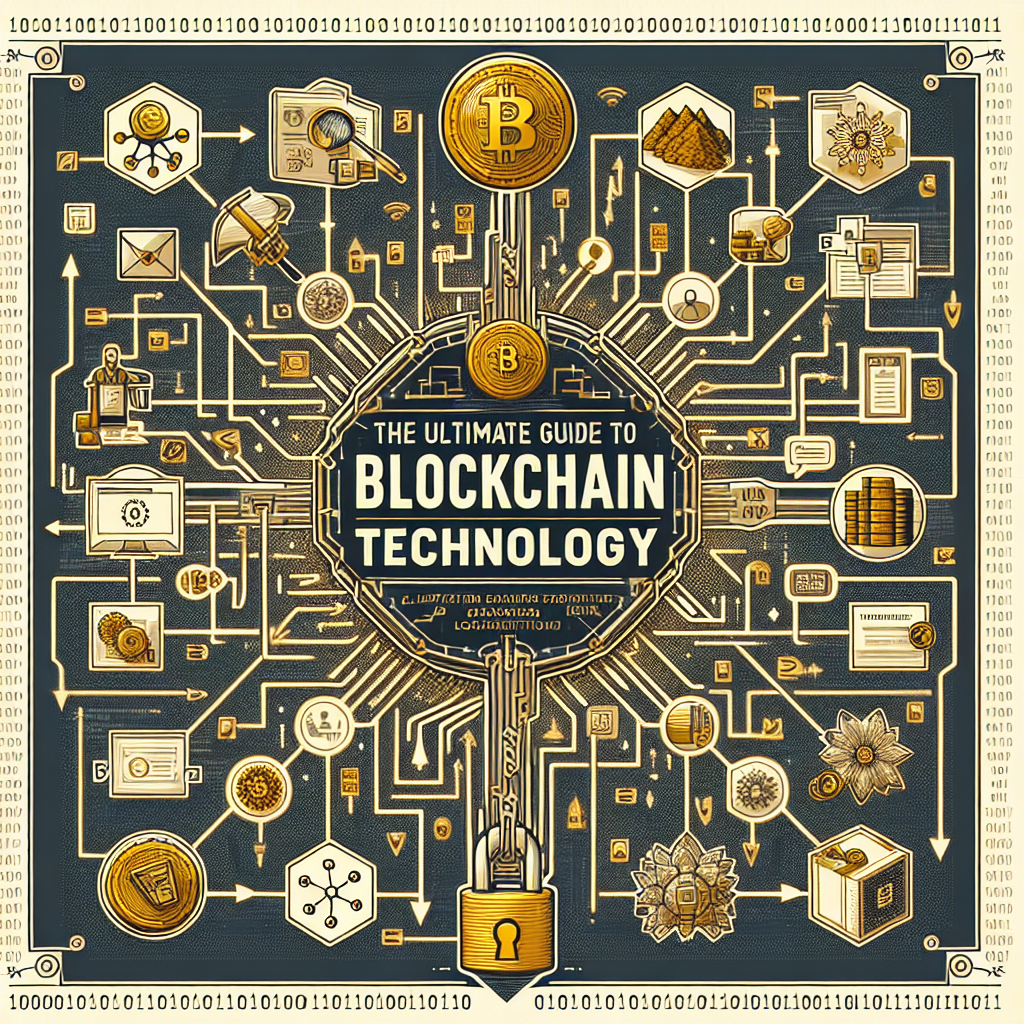Unlock the Power of Decentralization: Your Ultimate Guide to Blockchain Technology.
Thank you for reading this post, don't forget to subscribe!Introduction
The Ultimate Guide to Blockchain Technology is a comprehensive resource that provides an in-depth understanding of the revolutionary technology that is transforming various industries. This guide covers the fundamentals of blockchain, its applications, and its potential impact on the future of digital transactions and data management. It is designed for both beginners and experts who want to gain a deeper insight into the inner workings of blockchain and how it can be leveraged for various use cases.
Understanding the Basics of Blockchain Technology
Blockchain technology has been making waves in the tech industry for quite some time now. It is a revolutionary concept that has the potential to change the way we conduct transactions and store data. But what exactly is blockchain technology, and how does it work? In this ultimate guide, we will explore the basics of blockchain technology and how it is transforming the digital world.
At its core, blockchain technology is a decentralized digital ledger that records transactions across a network of computers. This means that no single entity has control over the data, making it highly secure and tamper-proof. Each transaction is recorded as a “block” and is linked to the previous block, creating a “chain” of transactions. This is where the term “blockchain” comes from.
One of the key features of blockchain technology is its transparency. Every transaction is visible to all participants in the network, ensuring that there is no room for fraud or manipulation. This level of transparency is particularly useful in industries such as finance, where trust is paramount.
Another important aspect of blockchain technology is its immutability. Once a transaction is recorded on the blockchain, it cannot be altered or deleted. This makes it an ideal platform for storing sensitive data, such as medical records or legal documents.
Blockchain technology also offers a high level of security. Each block is encrypted, and the network is constantly monitored for any suspicious activity. This makes it incredibly difficult for hackers to penetrate the system and steal data.
One of the most well-known applications of blockchain technology is cryptocurrency. Bitcoin, the first and most famous cryptocurrency, is built on blockchain technology. Cryptocurrencies use blockchain to record transactions and create a secure, decentralized currency that is not controlled by any government or financial institution.
However, blockchain technology has the potential to be used in a wide range of industries beyond finance. For example, it could be used to create secure voting systems, streamline supply chain management, and even protect intellectual property rights.
Despite its many benefits, blockchain technology is not without its challenges. One of the biggest hurdles is scalability. As the number of transactions on the blockchain grows, the system can become slow and inefficient. Additionally, there is a steep learning curve for those who are not familiar with the technology, which can make it difficult for businesses to adopt.
In conclusion, blockchain technology is a game-changer in the digital world. Its decentralized nature, transparency, immutability, and security make it an attractive option for a wide range of industries. While there are still challenges to overcome, the potential for blockchain technology to transform the way we conduct transactions and store data is undeniable. As we continue to explore and develop this technology, it is clear that blockchain will play a significant role in shaping the future of the digital world.
Exploring the Potential Applications of Blockchain in Various Industries
Blockchain technology has been making waves in the tech industry for quite some time now. It is a decentralized digital ledger that records transactions across multiple computers in a way that ensures the security and integrity of the data. While it is most commonly associated with cryptocurrencies like Bitcoin, the potential applications of blockchain technology extend far beyond just digital currencies.
One of the most promising applications of blockchain technology is in the supply chain industry. By using blockchain to track the movement of goods from the manufacturer to the end consumer, companies can ensure the authenticity and quality of their products. This is particularly useful in industries like pharmaceuticals and food, where counterfeit or contaminated products can have serious consequences. Blockchain can also help to reduce the risk of fraud and theft in the supply chain, as every transaction is recorded and cannot be altered.
Another industry that could benefit from blockchain technology is healthcare. Medical records are highly sensitive and need to be kept secure, but they also need to be easily accessible to healthcare providers. Blockchain can provide a solution to this problem by creating a secure and decentralized database of medical records that can be accessed by authorized personnel. This would not only improve the efficiency of healthcare delivery but also help to prevent medical errors and improve patient outcomes.
The financial industry is also exploring the potential of blockchain technology. Banks and other financial institutions are looking at ways to use blockchain to streamline their operations and reduce costs. For example, blockchain could be used to settle transactions more quickly and securely, reducing the need for intermediaries like clearinghouses. This could lead to faster and cheaper cross-border payments, making it easier for businesses to operate globally.
In the real estate industry, blockchain technology could be used to create a transparent and tamper-proof record of property ownership. This would make it easier to buy and sell property, as well as reduce the risk of fraud. It could also help to speed up the process of transferring ownership, as all the necessary information would be readily available on the blockchain.
The potential applications of blockchain technology are not limited to these industries, however. It could also be used in areas like voting, where it could help to prevent election fraud by creating a secure and verifiable record of votes. It could also be used in the energy sector to create a decentralized grid that allows consumers to buy and sell excess energy directly to each other.
In conclusion, blockchain technology has the potential to revolutionize a wide range of industries. By providing a secure and decentralized way to record transactions, it can help to improve efficiency, reduce costs, and prevent fraud. As the technology continues to develop, we can expect to see even more innovative applications of blockchain in the future. Whether it’s in supply chain management, healthcare, finance, real estate, or any other industry, blockchain has the potential to transform the way we do business.
The Future of Blockchain: Trends and Predictions for the Next Decade
Blockchain technology has been making waves in the tech industry for the past decade, and it shows no signs of slowing down. As we look to the future, there are several trends and predictions that experts believe will shape the next decade of blockchain development.
One of the most significant trends in blockchain technology is the increasing adoption of decentralized finance (DeFi) platforms. DeFi platforms use blockchain technology to offer financial services without the need for traditional intermediaries like banks. This trend is expected to continue as more people become aware of the benefits of DeFi, such as lower fees, faster transactions, and increased accessibility.
Another trend that is expected to shape the future of blockchain is the integration of blockchain with other emerging technologies. For example, the combination of blockchain and the Internet of Things (IoT) has the potential to create a more secure and efficient way to manage and track devices. Similarly, the integration of blockchain with artificial intelligence (AI) could lead to more secure and transparent AI systems.
In addition to these trends, there are several predictions for the future of blockchain technology. One prediction is that blockchain will become more user-friendly, making it easier for people to use and understand. This could lead to increased adoption of blockchain technology by individuals and businesses alike.
Another prediction is that blockchain will play a significant role in the fight against climate change. Blockchain technology can be used to track and verify carbon emissions, making it easier for companies to reduce their carbon footprint. Additionally, blockchain can be used to create more efficient and sustainable supply chains, reducing waste and improving resource management.
Finally, there is a prediction that blockchain will become more regulated in the coming years. As blockchain technology becomes more mainstream, governments and regulatory bodies will likely implement more rules and regulations to ensure that it is used responsibly. This could lead to increased trust in blockchain technology and further adoption by businesses and individuals.
Overall, the future of blockchain technology looks bright. With the increasing adoption of DeFi platforms, the integration of blockchain with other emerging technologies, and the potential for blockchain to play a role in the fight against climate change, there are many exciting developments on the horizon. Additionally, as blockchain technology becomes more user-friendly and regulated, it is likely to become more widely adopted by individuals and businesses alike.
In conclusion, the next decade of blockchain technology is poised to be a transformative one. With the trends and predictions outlined above, we can expect to see blockchain technology continue to evolve and shape the way we interact with the digital world. Whether it’s through the adoption of DeFi platforms, the integration with other technologies, or the role it plays in sustainability efforts, blockchain technology is set to have a significant impact on our lives in the years to come.
Conclusion
The Ultimate Guide to Blockchain Technology provides a comprehensive overview of the technology behind cryptocurrencies and its potential applications beyond digital currencies. It explains the concept of decentralized ledgers, how transactions are recorded and verified, and the security measures in place to prevent fraud. The guide also explores the various industries that can benefit from blockchain technology, such as supply chain management, healthcare, and finance. Overall, the guide concludes that blockchain technology has the potential to revolutionize many aspects of our lives by providing a secure, transparent, and efficient way to conduct transactions and store data.








